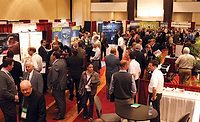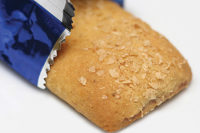Supplier Spotlight: Developing Advanced Adhesive Formulations
A company takes a scientific approach to innovation.

 The Lubrizol Corporation has long been a global player in the development of additives, polymers, and custom formulations that enhance the quality and performance of other products. Now Lubrizol is applying its know-how to enhance its presence in the adhesives market.
The Lubrizol Corporation has long been a global player in the development of additives, polymers, and custom formulations that enhance the quality and performance of other products. Now Lubrizol is applying its know-how to enhance its presence in the adhesives market.
Lubrizol’s product portfolio presents a complete line of resins and polymers structured to improve the performance of adhesives for the food packaging and construction industries, as well as specialty applications such as pressure-sensitive adhesives, wet/dry lamination, protective maskants, and removable film. This “toolbox” of solutions includes everything from high-performance polyurethanes to acrylics and PVC emulsions.
“Controlled adhesion is a competency you need for developing effective maskants and removable film,” says Larry Schnieders, Lubrizol global applications lead for performance coatings “It’s the linchpin to whether or not a maskant is a successful product. When you look at maskants and removable film in general, the trends are toward longer term protection, and especially longer term outdoor protection. The key is being able to control and understand the adhesion after exposure, even in extreme temperature and moisture conditions that you will see year-round outdoors.”
“We excel in maskants and removable film, which is where controlled adhesion is so critical,” adds Arul Mathew, Lubrizol global market manager for performance coatings. “You’ve got to get it right. The adhesive must be sticky enough, but not too sticky. Many adhesives, especially in food applications, must have that reliable bond and easy removal. Of course, adhesives in many of those applications have to be FDA-compliant, environmentally friendly, and so on. More importantly, however, adhesives using controlled adhesion must be able to stick to a variety of challenging substrates (such as different kinds of plastics, films, and foils, etc.).”
Often, adhesive products are expected to do more than simply adhere. While Lubrizol specializes in multi-functional adhesive applications, the company has vast resources and is expected to bring more to the table. For example, since packaged products often go into microwavable packaging, the adhesives are also expected to withstand high temperatures and high humidity levels.
Understanding the fundamentals of adhesion and having the technological capability and application knowledge to extrapolate them has allowed Lubrizol to generate innovative solutions. One example is the niche sector of aerosol adhesives. Lubrizol has developed the capability of making aerosol-stable waterborne adhesives.
“It’s a big step,” says Schnieders. “Not only are our aerosols stable, but they work well with the propellants. Once in the can, they maintain aerosol stability but do not pit the inside of the can like other waterborne products might. Corrosion is one major barrier that has kept waterborne from moving into the aerosol market.”
The aerosol adhesives market itself is not as big as other adhesives markets, but there are applications today for aerosol adhesives and those adhesives are beneficial from a VOC standpoint.
“Controlled adhesion is crucial to moving in a low-VOC direction,” Schnieders says. “I believe our application may spread to other types of adhesives. Equally important, we can use the same methodologies we used to develop a waterborne aerosol adhesive to develop a waterborne polyurethane adhesive and a two-component, solvent-borne polyurethane adhesive. It’s a true innovation that brings value to the market, and we work to transform ideas into real solutions that address unmet needs in the marketplace.”
“When faced with this kind of situation, we look for new solutions that require us to bring a higher level of understanding about the fundamental structure-property performance,” says Schnieders. “We look at the structure-property relationships. We want to fix a problem, but we also want to understand why it exists in the first place. That’s what drives us to innovate and make polymers with the required properties instead of ‘advances’ that are made via serendipity or a scattershot approach, where you shake the shelf and try whatever falls off. We take what we’d like to believe is a guided approach based on strong science and fundamentals.”
To accomplish this, Lubrizol looks for scientists from the industries it serves. Having experts with intimate knowledge of specific industries allows Lubrizol to help customers resolve issues particular to that industry. The lead application personnel working in Lubrizol’s adhesives group are from those industries and have been hands-on in the use and development of these adhesive products-formulation, compounding, application to the surfaces or the substrates of interest, important properties, and testing. The Lubrizol team understands what their customers need on a more essential basis, right down to peel adhesion and tack.
Lubrizol scientists do not do all this in a vacuum; they typically work very closely with their customers. Many correspond with customers frequently, read trade publications, publish white papers, and attend industry trade shows. At the same time, they are making polymers and additives for their customers. Lubrizol has synthesis capability: the applications groups work closely with a polymerization scientist to connect the structure property to the performance a customer wants. This is critical because a customer that orders an adhesive will typically say, “I need something that adheres to this surface, this strongly, under these conditions. Make it.”
“Once they say that, it is up to me to determine what polymer and then what formulation of that polymer will meet the customer’s requirement,” says Schnieders, who leads several applications groups. “Because I work so closely with our polymerization scientists, our groups can understand when they change a particular parameter-say its molecular weight or the amount of crosslinking within the polymer-and the impact that has meeting our customers’ specifications.”
According to Schnieders, Lubrizol is also one of the few companies that can produce such a wide range of waterborne polymers, including acrylics, polyurethanes, PU-acrylic composites, styrene acrylics, vinyl chlorides, vinylidene chlorides and water-soluble polymers. It also provides a line of surface modifiers and can avail itself of all applicable Lubrizol technologies to meet customers’ requirements.
“We have recruited people who have worked with adhesives in the industries we serve,” says Mathew. “That allows us to understand customer needs and applications, and develop solutions accordingly. Because of Lubrizol’s broader involvement in various industries such as transportation, construction, and packaging, we have a much better knowledge of adhesive issues in those industries. That is a unique capability. With our expertise in a particular industry, we accurately recognize the challenges of that industry and create custom solutions to address them.”
This in-depth knowledge of various end-use markets has allowed Lubrizol to develop proficiencies that allow it to successfully sell products like protective maskants. “We bring the expertise that allows us to make products that will work well when you put them on a surface, they will age well, the adhesion is not going to change significantly over time, and you’ll still be able to remove that protective maskant after its lifetime,” says Schnieders. “What’s more, the product it has protected is still in excellent shape. So, how do you make products that are easy to use, give you good adhesion, have the right properties, go where you want them to, stay there in a nice bead, have quick grab, and still have some workability and high ultimate bond so they don’t fail? It is absolutely critical to be able to do all these things properly, from developing the polymer to formulating the finished adhesive-that is a core competency of ours.”
While Lubrizol may not have been the biggest player in the adhesives arena historically, it is emerging as a solid player with its own distinctive capabilities and approach to providing unique adhesive solutions that contribute significantly to customers’ success.
For more information, visit www.lubrizolcoatings.com.


Lubrizol’s product portfolio presents a complete line of resins and polymers structured to improve the performance of adhesives for the food packaging and construction industries, as well as specialty applications such as pressure-sensitive adhesives, wet/dry lamination, protective maskants, and removable film. This “toolbox” of solutions includes everything from high-performance polyurethanes to acrylics and PVC emulsions.
The Pathway to Success
Behind Lubrizol’s ascent in the adhesives sector is its continuous investment in people, assets and fundamental research on adhesion. This commitment has led to an understanding of controlled adhesion as one of Lubrizol’s core strengths and the underpinning of many Lubrizol products.“Controlled adhesion is a competency you need for developing effective maskants and removable film,” says Larry Schnieders, Lubrizol global applications lead for performance coatings “It’s the linchpin to whether or not a maskant is a successful product. When you look at maskants and removable film in general, the trends are toward longer term protection, and especially longer term outdoor protection. The key is being able to control and understand the adhesion after exposure, even in extreme temperature and moisture conditions that you will see year-round outdoors.”
“We excel in maskants and removable film, which is where controlled adhesion is so critical,” adds Arul Mathew, Lubrizol global market manager for performance coatings. “You’ve got to get it right. The adhesive must be sticky enough, but not too sticky. Many adhesives, especially in food applications, must have that reliable bond and easy removal. Of course, adhesives in many of those applications have to be FDA-compliant, environmentally friendly, and so on. More importantly, however, adhesives using controlled adhesion must be able to stick to a variety of challenging substrates (such as different kinds of plastics, films, and foils, etc.).”
Often, adhesive products are expected to do more than simply adhere. While Lubrizol specializes in multi-functional adhesive applications, the company has vast resources and is expected to bring more to the table. For example, since packaged products often go into microwavable packaging, the adhesives are also expected to withstand high temperatures and high humidity levels.
Understanding the fundamentals of adhesion and having the technological capability and application knowledge to extrapolate them has allowed Lubrizol to generate innovative solutions. One example is the niche sector of aerosol adhesives. Lubrizol has developed the capability of making aerosol-stable waterborne adhesives.
“It’s a big step,” says Schnieders. “Not only are our aerosols stable, but they work well with the propellants. Once in the can, they maintain aerosol stability but do not pit the inside of the can like other waterborne products might. Corrosion is one major barrier that has kept waterborne from moving into the aerosol market.”
The aerosol adhesives market itself is not as big as other adhesives markets, but there are applications today for aerosol adhesives and those adhesives are beneficial from a VOC standpoint.
“Controlled adhesion is crucial to moving in a low-VOC direction,” Schnieders says. “I believe our application may spread to other types of adhesives. Equally important, we can use the same methodologies we used to develop a waterborne aerosol adhesive to develop a waterborne polyurethane adhesive and a two-component, solvent-borne polyurethane adhesive. It’s a true innovation that brings value to the market, and we work to transform ideas into real solutions that address unmet needs in the marketplace.”
Critical Industry Knowledge
The innovation mindset is evident at Lubrizol. Customers often present Lubrizol scientists with problems they have been working on but have been unable to solve. For example, a customer might need a maskant adhesive that will stick to a difficult-to-adhere surface, endure exposure to high humidity for a long period of time, and remove easily after three months without leaving any residue or discoloring the surface.“When faced with this kind of situation, we look for new solutions that require us to bring a higher level of understanding about the fundamental structure-property performance,” says Schnieders. “We look at the structure-property relationships. We want to fix a problem, but we also want to understand why it exists in the first place. That’s what drives us to innovate and make polymers with the required properties instead of ‘advances’ that are made via serendipity or a scattershot approach, where you shake the shelf and try whatever falls off. We take what we’d like to believe is a guided approach based on strong science and fundamentals.”
To accomplish this, Lubrizol looks for scientists from the industries it serves. Having experts with intimate knowledge of specific industries allows Lubrizol to help customers resolve issues particular to that industry. The lead application personnel working in Lubrizol’s adhesives group are from those industries and have been hands-on in the use and development of these adhesive products-formulation, compounding, application to the surfaces or the substrates of interest, important properties, and testing. The Lubrizol team understands what their customers need on a more essential basis, right down to peel adhesion and tack.
Lubrizol scientists do not do all this in a vacuum; they typically work very closely with their customers. Many correspond with customers frequently, read trade publications, publish white papers, and attend industry trade shows. At the same time, they are making polymers and additives for their customers. Lubrizol has synthesis capability: the applications groups work closely with a polymerization scientist to connect the structure property to the performance a customer wants. This is critical because a customer that orders an adhesive will typically say, “I need something that adheres to this surface, this strongly, under these conditions. Make it.”
“Once they say that, it is up to me to determine what polymer and then what formulation of that polymer will meet the customer’s requirement,” says Schnieders, who leads several applications groups. “Because I work so closely with our polymerization scientists, our groups can understand when they change a particular parameter-say its molecular weight or the amount of crosslinking within the polymer-and the impact that has meeting our customers’ specifications.”
According to Schnieders, Lubrizol is also one of the few companies that can produce such a wide range of waterborne polymers, including acrylics, polyurethanes, PU-acrylic composites, styrene acrylics, vinyl chlorides, vinylidene chlorides and water-soluble polymers. It also provides a line of surface modifiers and can avail itself of all applicable Lubrizol technologies to meet customers’ requirements.
“We have recruited people who have worked with adhesives in the industries we serve,” says Mathew. “That allows us to understand customer needs and applications, and develop solutions accordingly. Because of Lubrizol’s broader involvement in various industries such as transportation, construction, and packaging, we have a much better knowledge of adhesive issues in those industries. That is a unique capability. With our expertise in a particular industry, we accurately recognize the challenges of that industry and create custom solutions to address them.”
This in-depth knowledge of various end-use markets has allowed Lubrizol to develop proficiencies that allow it to successfully sell products like protective maskants. “We bring the expertise that allows us to make products that will work well when you put them on a surface, they will age well, the adhesion is not going to change significantly over time, and you’ll still be able to remove that protective maskant after its lifetime,” says Schnieders. “What’s more, the product it has protected is still in excellent shape. So, how do you make products that are easy to use, give you good adhesion, have the right properties, go where you want them to, stay there in a nice bead, have quick grab, and still have some workability and high ultimate bond so they don’t fail? It is absolutely critical to be able to do all these things properly, from developing the polymer to formulating the finished adhesive-that is a core competency of ours.”
A World of Applications
Lubrizol develops its innovative adhesive formulations in all the regions of the world. The company owns and operates manufacturing facilities in 17 countries, as well as sales and technical offices around the world. Many of these facilities are able to handle a range of viscosities and have the capability to make specialty custom adhesive formulations that fall into very high viscosity ranges. They are also supported by world-class research and application testing capabilities.While Lubrizol may not have been the biggest player in the adhesives arena historically, it is emerging as a solid player with its own distinctive capabilities and approach to providing unique adhesive solutions that contribute significantly to customers’ success.
For more information, visit www.lubrizolcoatings.com.
Links
Looking for a reprint of this article?
From high-res PDFs to custom plaques, order your copy today!





